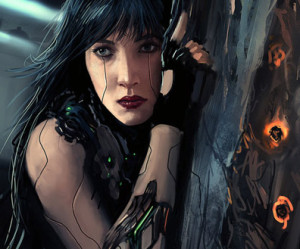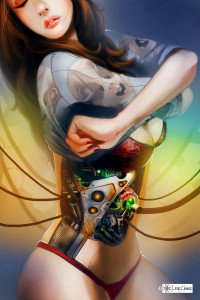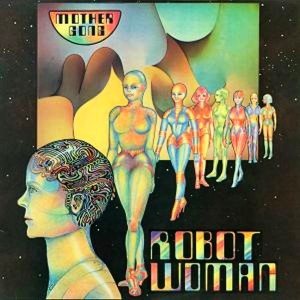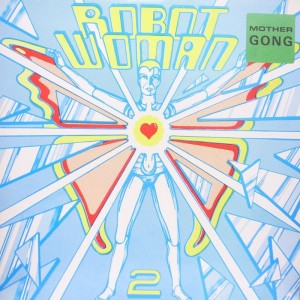For years and years now, I’ve been searching the old Googles for images of robot women. Some of these searches have been quite fruitful.
And other’s not. But there is this one album that kept popping up whenever I searched for the term “robot woman”. Since I’m a music fan too, I tried to find out about it and maybe even sample some of it, but this proved to be damn near impossible – until now.
Someone had finally uploaded the entire album to YouTube, and some more information about both the band and the album has been filled in on Wikipedia and ProgArchives.com.
First, the band. Mother Gong is an offshoot of a prog rock band called Gong, and I actually have some of Gong’s material. It’s good. Progressive rock is right up my alley, and I enjoy improvisation too. The music of Mother Gong – from what I can tell – is similar in experimentation and adventurousness. The driving ideology behind the lyrical themes, however, seems to be the kind of crazy radical feminism that only serves to cause damage and stir up hatred.
I’m only judging this by these first two “Robot Woman” albums I’ve listened to. They’re part of a trilogy. I haven’t found the third album anywhere, and to be honest, I don’t think I’ll look any further for it.
Before I had heard these albums, I had wondered what they might be like. Now, I consider myself a supporter of feminist causes, like equal rights for women, equal pay for equal work, and all that good stuff. But I have a real problem with the type of “feminism” that considers all men rapists. Anybody who seriously spouts that kind of nonsense is letting their anger run faster than their IQ, and they need to shut their fucking mouth and do some thinking.
But let’s focus on the content of the albums, and how they fit into the world of technosexuality. (Spoiler: they don’t)
Robot Woman (1981)
Track listing:
- Disco at the End of the World / Woman’s Place
- Robot Woman
- Machine Song / The Sea
- Searching the Airwaves
- Billi Bunker’s Blues
- Military Procession / Customs Man – Rapist
- Fire
- Red Alert / Stars
- Australia
Musically speaking, this album has 4 very strong songs on it. Those are “Disco at the End of the World”, “Machine Song”, “Billi Bunker’s Blues”, and “Australia”. The musicians are actually outstanding, and more often than not they are playing something interesting if not enjoyable.
The highlight of the music, for me at least, is the presence of the incomparable Guy Evans on drums. He’s one of my favourite drummers, and I’ve never heard him put in a disappointing performance. The drums on this album are fantastic. Steve Hilliage is here too, playing guitar on a few songs.
But then there are the lyrics. Oh god, the lyrics. They actually start out kind of clever, and when Gilli Smyth (Mother Gong’s resident feminist and “poet”) isn’t singing, they almost stay that way. Things devolve into a childish, angry feminist screed right fast; halfway through “Machine Song” is where it starts to turn.
Since this is a concept album, allow me to explain the concept. Beta is a robot woman who (surprise surprise) wants to be a real woman. No explanation is given for this thing that would never actually happen, and pretty soon it is just accepted that none is needed. In fact the whole robot woman thing goes from character to allegorical premise before side 1 is over. It’s basically a setup to let us all know that:
- Men are slovenly, lascivious pigs
- Men love keeping slaves
- Men are rapists
- Men want to kill everyone with nuclear weapons
Got that? Good. I hope you’re feeling guilty, you despicable man.
So Beta is a robot woman owned by a man, and she malfunctions by having thoughts of her own. The man calls a repairman, who fixes her and gives her a “satellite radio phone” so she can talk to other robot women for some reason. Instead she ends up talking to a government agent (a man) who reports her to the authorities – “The Customs Man”. Then she sees a military parade and asks some very thought provoking questions that weren’t written by a 12-year-old, I swear. The Customs Man then rapes her, because that’s just what he does. He’s a man, remember? Then “Poetry” happens. Then nuclear war kills everyone, and Alien Feminists from Another Planetâ„¢ contact her on her satellite radio phone, and she is “free”. The last song is kind of tacked on and I’m glad it is. It’s one of the only cringe-less songs on the album.
Now, I’m a huge fan of this kind of music. And this album features one of my favourite musicians. But I’ll be damned if I ever subject myself to this idiotic morality play dressed up like a rock opera again. Piss off, Gilli Smyth. I’m not a rapist.
The only two songs that are even remotely worth listening to for the sake of ASFR content are “Disco at the End of the World” and “Machine Song“. I’ve done some audio restoration on the vinyl rips uploaded to YouTube, so download them and give them a listen.
Robot Woman 2 (1982)
Track listing:
- Suggestive Station
- This Train
- I Wanna Be With You
- The Moving Walkaway
- The Upwardly Mobile Song
- Tigers or Elephants / Mirror
- You Can Touch the Sky
- 1999
- Crazy Town
- Angry Song / My Life
- Leotards
I like the music on this album a little better than the first one. It sounds better to me overall, and more consistent. There are less draggy moments, but there aren’t any really stand-out great tunes either like the first one had. There’s no Steve Hilliage this time around either.
The lyrics are less didactic, though to substitute they are more “poetic” and their meaning is harder to pin down. I think the story of the album goes like this:
The nuclear war that happens on the first album has killed all the humans. Beta the robot woman who is sure she is a human being wanders around and meets other robots who are also pretty sure that they’re human beings. Then they see some sort of carnival attraction run by some sort of Wizard fellow who traps robot women in “mirror cages” for the sexual amusement of others. And of course these mirror cages are explained as representing sexism. That’s handled about as deftly as threading a sewing needle while wearing mittens. Through all of this, Beta the robot woman keeps asserting that she’s a human being. She’s the heroine of this infantile fantasy, so she uses her robotic superpowers (she heats her heart like a furnace) to break all the mirror cages and free all the robots, who are also human beings. Hooray. She travels to “Crazy Town” to see it burning from the destruction of the nuclear war, and all the robots are happy that all the humans are dead, because all they ever did was rape anyway. I’m serious. The last song is about transformation, but it’s so thick with Gilli’s artsy “poetry” that I couldn’t figure any of it out. Presumably it sets up the final album of the trilogy.
There are no ASFR-worthy songs on this album.
While not as immediately repulsive as the first album, Beta the robot woman is one repugnant character – especially to me. I love the idea of female robots, and I have for most of my life. I want nothing more than to see the day that realistic female androids are sold and affordable.
But these two albums illustrate a fallacy that is lamentably common. It is widespread among children, and they usually grow out of it. Sadly, this is not always the case. The fallacy that I am referring to is one where something that resembles a person is mistaken for a person.
Small children can be forgiven for thinking that dolls are just little people, and slightly older kids get a pass for believing the same for mannequins and things like that. But a grown, reasoning adult should fucking know better when it comes to a robot. Robots are things. Robots are not people. Most robots don’t even look anything like people, and it’s only now that this is even becoming a possibility. Appearance does not equal function.
I can’t take any of Gilli Smyth’s messages on these albums seriously. They range from inflammatorily wrong to childishly idiotic. Frankly, her lyrics ruin the albums for me. But at least now I know what’s on them.



